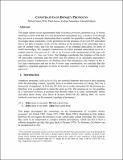| dc.contributor.author | Grosz, Patrick | |
| dc.contributor.author | Patel-Grosz, Pritty | |
| dc.contributor.author | Fedorenko, Evelina | |
| dc.contributor.author | Gibson, Edward A. | |
| dc.date.accessioned | 2016-06-06T13:52:45Z | |
| dc.date.available | 2016-06-06T13:52:45Z | |
| dc.date.issued | 2014-06 | |
| dc.date.submitted | 2014-06 | |
| dc.identifier.issn | 0167-5133 | |
| dc.identifier.issn | 1477-4593 | |
| dc.identifier.uri | http://hdl.handle.net/1721.1/102962 | |
| dc.description.abstract | This article reports on an experimental study of donkey pronouns, pronouns (e.g. it) whose meaning covaries with that of a non-pronominal noun phrase (e.g. a donkey) even though they are not in a structural relationship that is suitable for quantifier-variable binding. We investigate three constraints, (i) the preference for the presence of an overt NP antecedent that is not part of another word, (ii) the salience of the position of an antecedent that is part of another word, and (iii) the uniqueness of an intended antecedent (in terms of world knowledge). We compare constructions in which intended antecedents occur in a context such as who owns an N / who is an N-owner with constructions of the type who was without an N / who was N-less. Our findings corroborate the existence of the overt NP antecedent constraint, and also show that the salience of an unsuitable antecedent’s position matters. Furthermore, our findings show that uniqueness only matters in the N-less type construction and not in the N-owner type construction; we conclude that this supports a potential approach in terms of dynamic semantics over a competing e-type approach. | en_US |
| dc.description.sponsorship | Daimler AG (Benz Foundation grant 32-01/12) | en_US |
| dc.description.sponsorship | University of Turbingen (grant 09021401) | en_US |
| dc.language.iso | en_US | |
| dc.publisher | Oxford University Press | en_US |
| dc.relation.isversionof | http://dx.doi.org/10.1093/jos/ffu009 | en_US |
| dc.rights | Creative Commons Attribution-Noncommercial-Share Alike | en_US |
| dc.rights.uri | http://creativecommons.org/licenses/by-nc-sa/4.0/ | en_US |
| dc.source | Prof. Gibson via Courtney Crummett | en_US |
| dc.title | Constraints on Donkey Pronouns | en_US |
| dc.type | Article | en_US |
| dc.identifier.citation | Grosz, P. G., P. Patel-Grosz, E. Fedorenko, and E. Gibson. “Constraints on Donkey Pronouns.” Journal of Semantics 32, no. 4 (July 15, 2014): 619–648. | en_US |
| dc.contributor.department | Massachusetts Institute of Technology. Department of Brain and Cognitive Sciences | en_US |
| dc.contributor.approver | Gibson, Edward A. | en_US |
| dc.contributor.mitauthor | Gibson, Edward A. | en_US |
| dc.relation.journal | Journal of Semantics | en_US |
| dc.eprint.version | Author's final manuscript | en_US |
| dc.type.uri | http://purl.org/eprint/type/JournalArticle | en_US |
| eprint.status | http://purl.org/eprint/status/PeerReviewed | en_US |
| dspace.orderedauthors | Grosz, P. G.; Patel-Grosz, P.; Fedorenko, E.; Gibson, E. | en_US |
| dspace.embargo.terms | N | en_US |
| dc.identifier.orcid | https://orcid.org/0000-0002-5912-883X | |
| mit.license | OPEN_ACCESS_POLICY | en_US |
